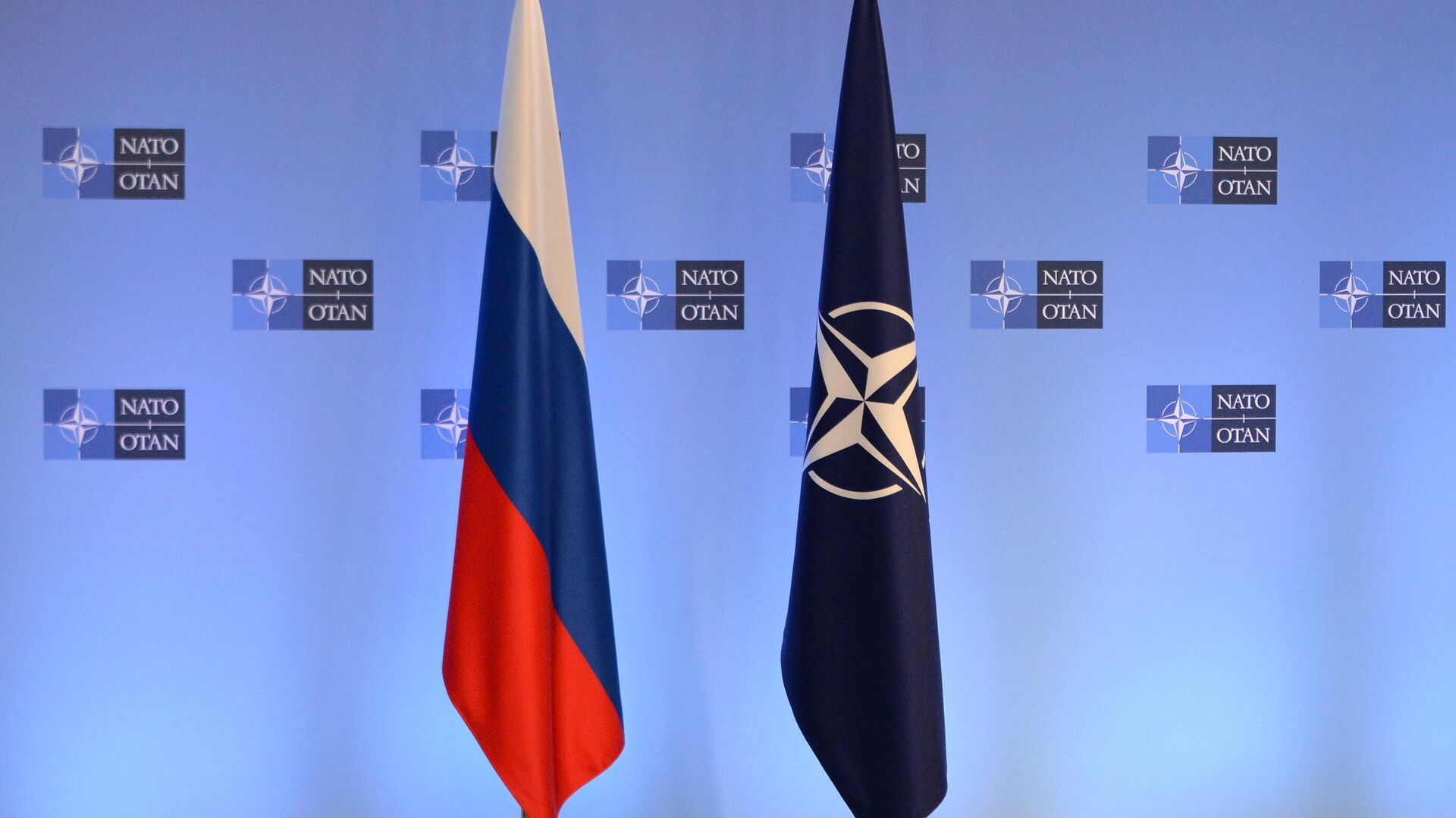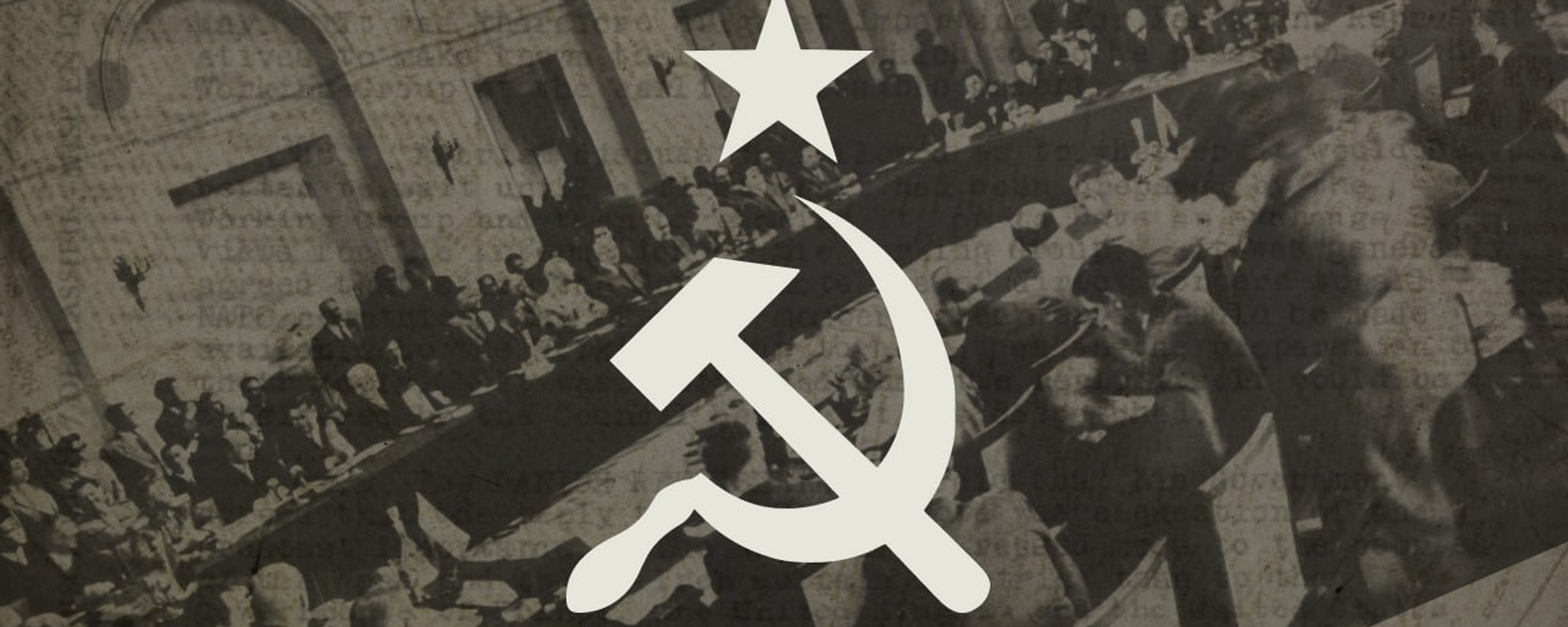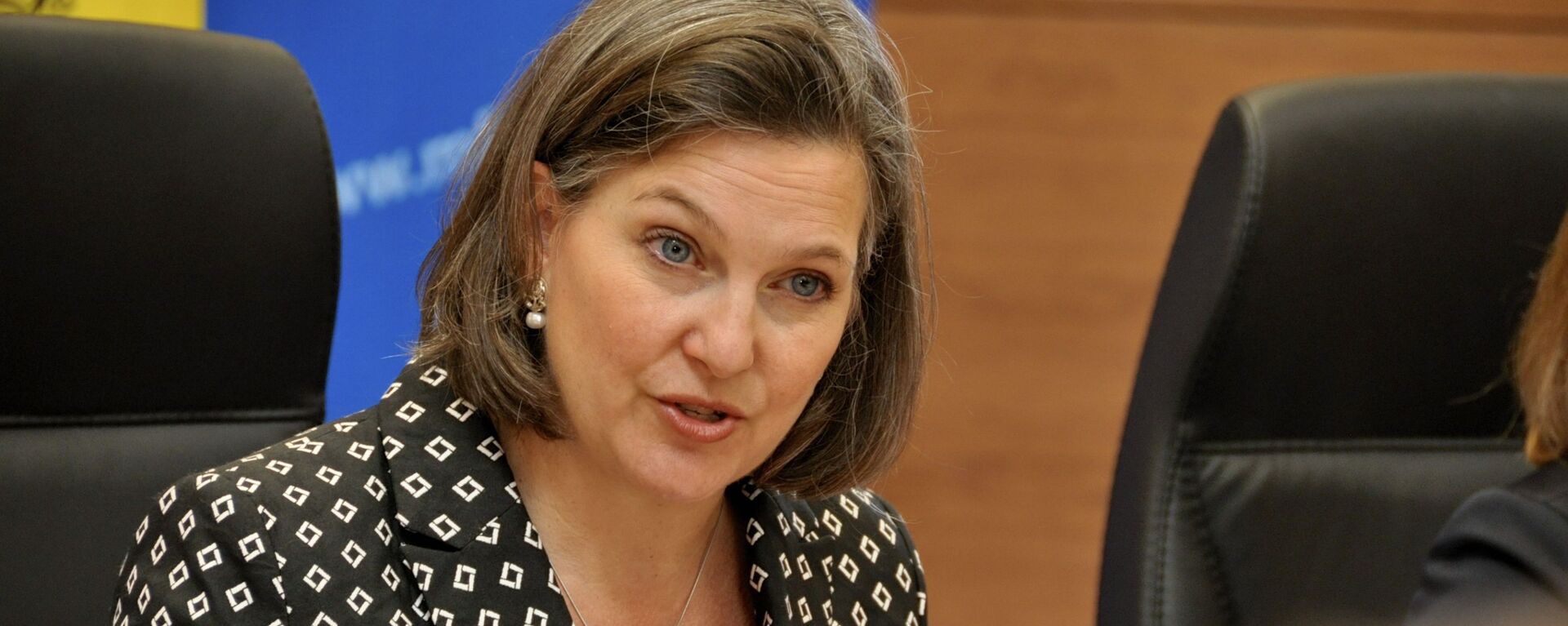https://sputnikglobe.com/20240331/hostile-reactions-from-the-west-why-russia-didnt-join-nato-1117664184.html
'Hostile Reactions From the West': Why Didn't Russia Join NATO?
'Hostile Reactions From the West': Why Didn't Russia Join NATO?
Sputnik International
Sunday marks the 70th anniversary of a little-known Soviet diplomatic offer: to join NATO and bring the Cold War security competition in Europe to an early end. The move would become one of at least three occasions in which Moscow would hint its aspirations to join the Western bloc. Why has it been rejected each time? Sputnik explores.
2024-03-31T09:00+0000
2024-03-31T09:00+0000
2024-04-04T13:54+0000
analysis
russia
ussr
moscow
michael maloof
vladimir putin
nato
warsaw pact
bill clinton
membership
https://cdn1.img.sputnikglobe.com/img/07e8/03/1f/1117666761_0:240:2790:1809_1920x0_80_0_0_3bac3eaee2e1f6ea53439120aeaf88e9.jpg
On March 31, 1954, Soviet Foreign Minister Vyacheslav Molotov shocked his US, French and British counterparts with a diplomatic note expressing Moscow’s readiness to join NATO.Chewing over the shock Soviet proposal for over a month, Washington eventually responded, sending Moscow a note on May 7, 1954 citing the “unrealistic nature of such a proposal” and stressing that “it contradicts the very principles on which the defense system and security of Western states depend.”Founded in April 1949, NATO’s official goals centered around “deterring Soviet expansionism” through collective defense for its members, which originally numbered 12 countries. Behind the scenes, the post-war security architecture created by the United States had other goals, including control over European countries’ domestic affairs. As Lord Hastings Ismay, the alliance’s first secretary-general, once famously put it, the purpose of NATO was to “keep the Soviet Union out, the Americans in, and the Germans down.”Before sending the March 1954 note, Soviet diplomats made several other attempts to convey to Washington the USSR’s interest in joining NATO as a mechanism for European collective security.In 1952, Soviet leader Joseph Stalin reportedly told French Ambassador Louis Joxe that if NATO was the peaceful, UN Charter-abiding organization President Charles De Gaulle described it as, the USSR might consider membership. The same year, Stalin sent Western powers a series of diplomatic cables proposing the reunification of Germany as a neutral power in the center of Europe separating the Eastern and Western blocs. Austria became such a country in 1955, with the USSR withdrawing troops in exchange for a commitment from Vienna for neutrality (which, incidentally, it continues to hold this day).In the post-Cold War period, both in the early 1990s and early 2000s, the Russia that emerged from the ashes of the USSR would again express its interest in membership in, or at least partnership with, the Western alliance, in the overarching interests of peace and security in Europe.President Boris Yeltsin and his first Foreign Minister Andrei Kozyrev, who famously quipped that Russia “has not national interests” apart from abstract “universal human values,” held intense negotiations with the Clinton administration through the early to mid-1990s on the prospects of Russian membership in the Western alliance. Clinton successfully pulled the wool over Yeltsin’s eyes, with the Russian leader swallowing as “brilliant” US assurances that Russia would be treated as an “equal partner,” and begrudgingly accepting the first round of eastward expansion by the alliance to Poland, Hungary, and the Czech Republic.After becoming president, Vladimir Putin too decided to probe US intentions vis-à-vis Russia at the dawn of the 21st century, recalling in his recent interview with Tucker Carlson that he had asked Clinton point blank what he thought about the idea of Russia in NATO.“If he had said yes, the process of rapprochement would have commenced, and eventually it might have happened if we had seen some sincere wish on the side of our partners. But it didn’t happen. Well, no means no, okay, fine,” Putin said.Ideology, Deep State, or Ancient Feuds?NATO could not have accepted the USSR into the alliance in the 1950s “because of the Cold War mentality” prevalent in the West at the time, says Michael Maloof, a former senior security policy analyst at the Pentagon.After the USSR fell, “there was another push for Russia to become a member,” Maloof told Sputnik. “Very early on Yeltsin wanted to do it,” with Putin, whose “whole orientation and professional background” lay in the West, similarly interested at first, the observer recalled.Each time, NATO was able to use the excuse of incompatible ideologies to reject Moscow’s advances, Maloof said, with these ranging from concerns over the spread of communism during the Cold War, to the purported incompatibility of post-Soviet Russia’s political system with the West’s.“You know, everybody has their own interpretation of what ‘democracy’ is. And so, they run NATO and set their own rules and [Russia] didn’t meet those rules. Turkiye went through that for quite some time. And they still are experiencing it to this day in an effort to join the EU,” Maloof said.There is no “on and off switch” to this sort of animosity, Maloof said, pointing to the inertia of the bureaucracy in NATO and Washington, not to mention the financial interests involved.“It’s hard to have people switch over to another mindset,” particularly in the intelligence community, the observer noted.Part of the animosity even comes down to hidden, ancient blood feuds, Maloof believes.“Take, for example, Victoria Nuland. Before she left [her job at the State Department, ed.] she was spearheading the entire ‘Ukrainian effort’. Why? What was her fanaticism all about? It turns out that her family was from western Ukraine. She just wanted ‘her property’ back, ‘her land’ back. You can see these ancient rivalries just go on and on,” the observer said. That’s also “why the Poles [are] so fascinated with Ukraine,” Maloof suggested, pointing to Warsaw’s conquest of much of what is modern-day Ukraine going back to the 14th century.These ancient feuds are “like a dormant cancer,” in Maloof’s estimation, which, when “aggravated…comes back again” to foment conflicts. “People in the 21st century don’t have a clue unless they’ve studied it…All of a sudden it’s all about ‘democracy and saving the world’. No, it’s deeper than that,” he stressed. “These pressures never die. They become dormant, and then they rise up again at a particular time in history – particularly during tough economic conditions or during a period of warfare.”Another reason why Russia could never join the alliance revolves around the fact that Moscow has always considered itself a great power, a nation that deserves the right to be considered an “equal partner,” according to Maloof.‘NATO Should Have Gone Away’Ultimately, Maloof stressed, it would have been “nice” to see “total cooperation” between the West and Russia, not only for security reasons, but economic ones – particularly as far as Europe is concerned.Better yet, he said, would have been for NATO to follow the Warsaw Pact's example and dissolve into oblivion at the end of the Cold War. “The Warsaw Pact went away. NATO should have gone away.”Unfortunately, he said, the reality is that there are people in the Western security establishment who consider the alliance to be “their rice bowl as a growth industry,” a tool to advance the Western agenda not only in Europe, but Asia, the Arctic, and even outer space.
https://sputnikglobe.com/20240331/what-happened-when-the-ussr-tried-to-join-nato-1117658974.html
https://sputnikglobe.com/20231003/how-clinton-used-russias-1993-crisis-to-dupe-yeltsin-on-natos-eastward-march-1113895633.html
https://sputnikglobe.com/20191231/russian-media-reveal-morning-events-of-boris-yeltsins-resignation-day-20-years-ago-1077911412.html
https://sputnikglobe.com/20240307/was-neocon-slay-queen-victoria-nuland-forced-out-1117177481.html
https://sputnikglobe.com/20240208/how-natos-obsession-with-ukraine-transformed-into-existential-threat-to-russian-heartland-1116674539.html
https://sputnikglobe.com/20220831/gorbachev-was-promised-non-expansion-of-nato-his-mistake-was-to-believe-it-ex-us-official-says-1100199807.html
russia
ussr
moscow
Sputnik International
feedback@sputniknews.com
+74956456601
MIA „Rossiya Segodnya“
2024
News
en_EN
Sputnik International
feedback@sputniknews.com
+74956456601
MIA „Rossiya Segodnya“
Sputnik International
feedback@sputniknews.com
+74956456601
MIA „Rossiya Segodnya“
did russia try to join nato, why did russia try to join nato, when did russia try to join nato, did soviet union want to join nato, did ussr try to join nato
did russia try to join nato, why did russia try to join nato, when did russia try to join nato, did soviet union want to join nato, did ussr try to join nato
'Hostile Reactions From the West': Why Didn't Russia Join NATO?
09:00 GMT 31.03.2024 (Updated: 13:54 GMT 04.04.2024) Sunday marks the 70th anniversary of a little-known Soviet diplomatic offer to have the USSR join NATO and bring the Cold War security competition in Europe to an early end. The move would become one of at least three occasions in which Moscow hinted at its aspirations to join the bloc. Why has it been rejected each time? Sputnik explores.
On March 31, 1954, Soviet Foreign Minister Vyacheslav Molotov shocked his US, French and British counterparts with a diplomatic note expressing Moscow’s readiness to join NATO.
If the USSR joined, the note said, “the North Atlantic Treaty Organization would cease to be a closed military grouping of states” and, opening its doors to other European powers, facilitate the creation of “an effective system of collective security in Europe, which would be of utmost importance for strengthening universal peace.”
Chewing over the shock Soviet proposal for over a month, Washington eventually responded, sending Moscow a note on May 7, 1954 citing the “unrealistic nature of such a proposal” and stressing that “it contradicts the very principles on which the defense system and security of Western states depend.”
Founded in April 1949, NATO’s official goals centered around “deterring Soviet expansionism” through collective defense for its members, which originally numbered 12 countries. Behind the scenes, the post-war security architecture created by the United States had other goals, including control over European countries’ domestic affairs. As Lord Hastings Ismay, the alliance’s first secretary-general, once famously put it, the
purpose of NATO was to “keep the Soviet Union out, the Americans in, and the Germans down.”
Before sending the March 1954 note, Soviet diplomats made several other attempts to convey to Washington the USSR’s interest in joining NATO as a mechanism for European collective security.
As veteran Soviet diplomat Andrei Gromyko put it in 1951, “if this pact was aimed against the restoration of German aggression, the USSR would join NATO.”
In 1952, Soviet leader Joseph Stalin reportedly
told French Ambassador Louis Joxe that if NATO was the peaceful, UN Charter-abiding organization President Charles De Gaulle described it as, the USSR might consider membership. The same year, Stalin sent Western powers a series of diplomatic cables proposing the reunification of Germany as a neutral power in the center of Europe separating the Eastern and Western blocs. Austria became such a country in 1955, with the USSR withdrawing troops in exchange for a commitment from Vienna for neutrality (which, incidentally, it continues to hold this day).
In the post-Cold War period, both in the early 1990s and early 2000s, the Russia that emerged from the ashes of the USSR would again express its interest in membership in, or at least partnership with, the Western alliance, in the overarching interests of peace and security in Europe.
President Boris Yeltsin and his first Foreign Minister Andrei Kozyrev, who famously
quipped that Russia “has not national interests” apart from abstract “universal human values,” held intense negotiations with the Clinton administration through the early to mid-1990s on the prospects of Russian membership in the Western alliance. Clinton successfully pulled the wool over Yeltsin’s eyes, with the Russian leader swallowing as
“brilliant” US assurances that Russia would be treated as an “equal partner,” and begrudgingly accepting the first round of eastward expansion by the alliance to Poland, Hungary, and the Czech Republic.
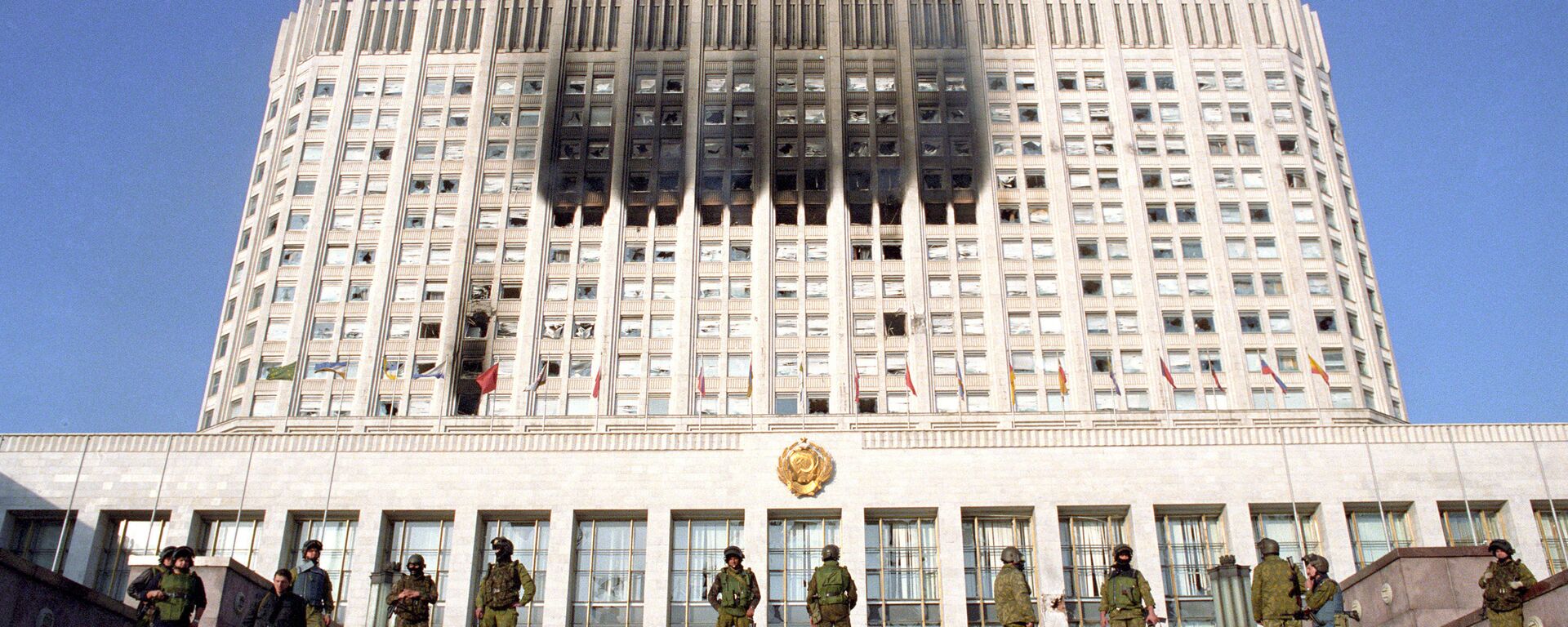
3 October 2023, 19:01 GMT
After becoming president, Vladimir Putin too decided to probe US intentions vis-à-vis Russia at the dawn of the 21st century, recalling in his recent interview with Tucker Carlson that he had asked Clinton point blank what he thought about the idea of Russia in NATO.
“I became president in 2000. I thought: okay, the Yugoslav issue is over, but we should try to restore relations. Let’s reopen the door that Russia tried to go through…At a meeting here in the Kremlin with the outgoing President Bill Clinton, right here in the next room, I asked him, ‘Bill, do you think if Russia asked to join NATO, do you think it would happen?’ Suddenly, he said ‘you know, it’s interesting, I think so’,” Putin
recalled. “But in the evening, when we had dinner, he said, ‘you know, I’ve talked to my team, no-no, it’s not possible now.”
“If he had said yes, the process of rapprochement would have commenced, and eventually it might have happened if we had seen some sincere wish on the side of our partners. But it didn’t happen. Well, no means no, okay, fine,” Putin said.
Ideology, Deep State, or Ancient Feuds?
NATO could not have accepted the USSR into the alliance in the 1950s “because of the Cold War mentality” prevalent in the West at the time, says Michael Maloof, a former senior security policy analyst at the Pentagon.
After the USSR fell, “there was another push for Russia to become a member,” Maloof told Sputnik. “Very early on Yeltsin wanted to do it,” with Putin, whose “whole orientation and professional background” lay in the West, similarly interested at first, the observer recalled.
Each time, NATO was able to use the excuse of incompatible ideologies to reject Moscow’s advances, Maloof said, with these ranging from concerns over the spread of communism during the Cold War, to the purported incompatibility of post-Soviet Russia’s political system with the West’s.
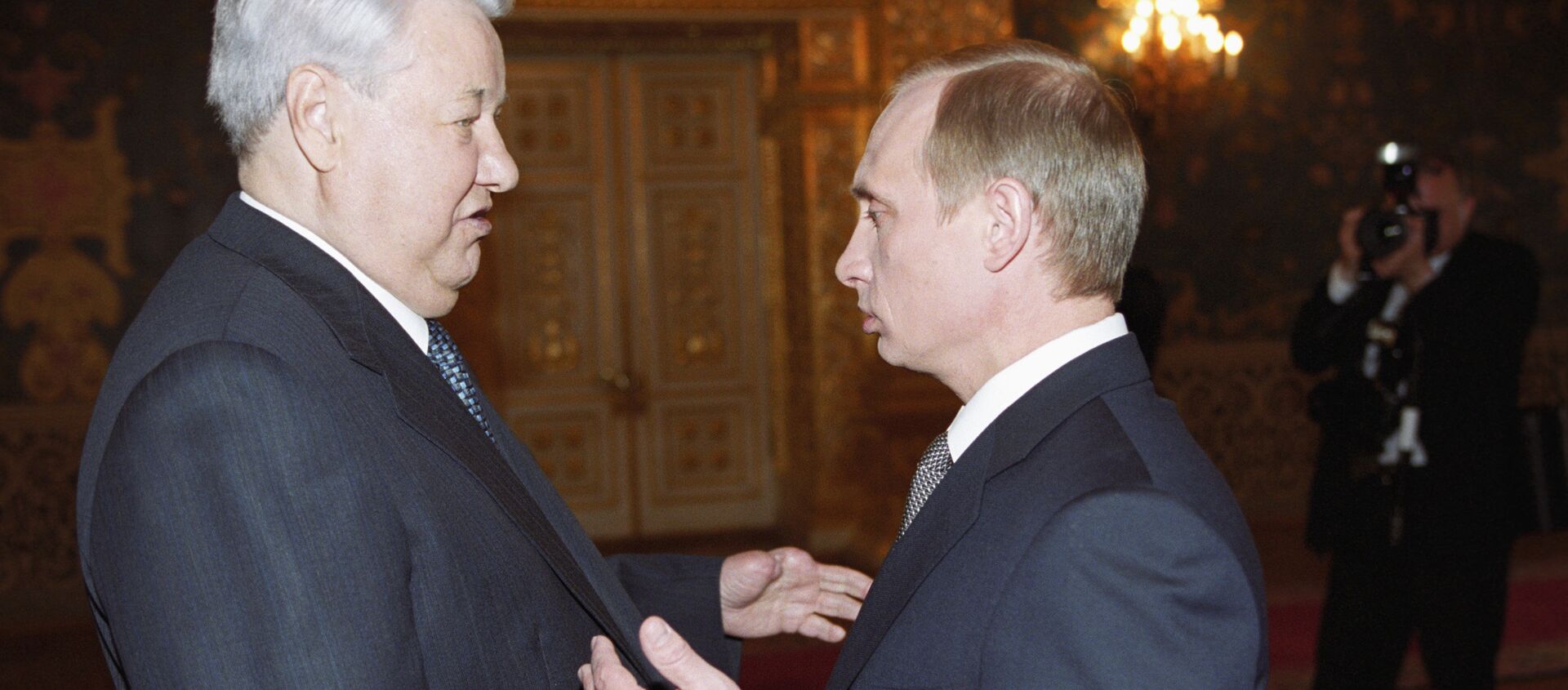
31 December 2019, 20:21 GMT
“You know, everybody has their own interpretation of what ‘democracy’ is. And so, they run NATO and set their own rules and [Russia] didn’t meet those rules. Turkiye went through that for quite some time. And they still are experiencing it to this day in an effort to join the EU,” Maloof said.
More serious, Maloof said, is the factor of the permanent deep state in Washington, specifically the “neoconservative movement against Russia, previously the Soviet Union,” manifesting itself in people like former deputy secretary of state Victoria Nuland. These people’s ambitions have always been and continue to be “to contain, if not chop up Russia.”
There is no “on and off switch” to this sort of animosity, Maloof said, pointing to the inertia of the bureaucracy in NATO and Washington, not to mention the financial interests involved.
“It’s hard to have people switch over to another mindset,” particularly in the intelligence community, the observer noted.
“We had 50 years of practice in the Soviet Union, and you have a lot of bureaucrats in the intelligence community that [consider antagonizing Russia] to be more of their ‘sweet spot’, as it were, to be comfortable in their jobs. That’s what they’re good at. The change [after 1991] was totally alien to them. Even Putin wanted to join NATO at first, but he began to see increasingly hostile reactions from the West. So Putin began to look more toward a Eurasian movement,” especially after the 2014 US-sponsored coup in Ukraine, Maloof said.
Part of the animosity even comes down to hidden, ancient blood feuds, Maloof believes.
“Take, for example, Victoria Nuland. Before she left [her job at the State Department, ed.] she was spearheading the entire ‘Ukrainian effort’. Why? What was her fanaticism all about? It turns out that her family was from western Ukraine. She just wanted ‘her property’ back, ‘her land’ back. You can see these ancient rivalries just go on and on,” the observer said. That’s also “why the Poles [are] so fascinated with Ukraine,” Maloof suggested, pointing to Warsaw’s conquest of much of what is modern-day Ukraine going back to the 14th century.
These ancient feuds are “like a dormant cancer,” in Maloof’s estimation, which, when “aggravated…comes back again” to foment conflicts. “People in the 21st century don’t have a clue unless they’ve studied it…All of a sudden it’s all about ‘democracy and saving the world’. No, it’s deeper than that,” he stressed. “These pressures never die. They become dormant, and then they rise up again at a particular time in history – particularly during tough economic conditions or during a period of warfare.”
Another reason why Russia could never join the alliance revolves around the fact that Moscow has always considered itself a great power, a nation that deserves the right to be considered an “equal partner,” according to Maloof.
“We noticed this, particularly in negotiations leading up to Putin’s demands in December of 2021 when he said ‘you’ve got to stop this expansion of NATO, including in Ukraine’ and that ‘this is a red line for us’…The reaction [from the West] was ‘well, we’re going to in effect do whatever we want’. They didn’t take him seriously. And the Russians felt that the US was talking down to Russia,” the observer said.
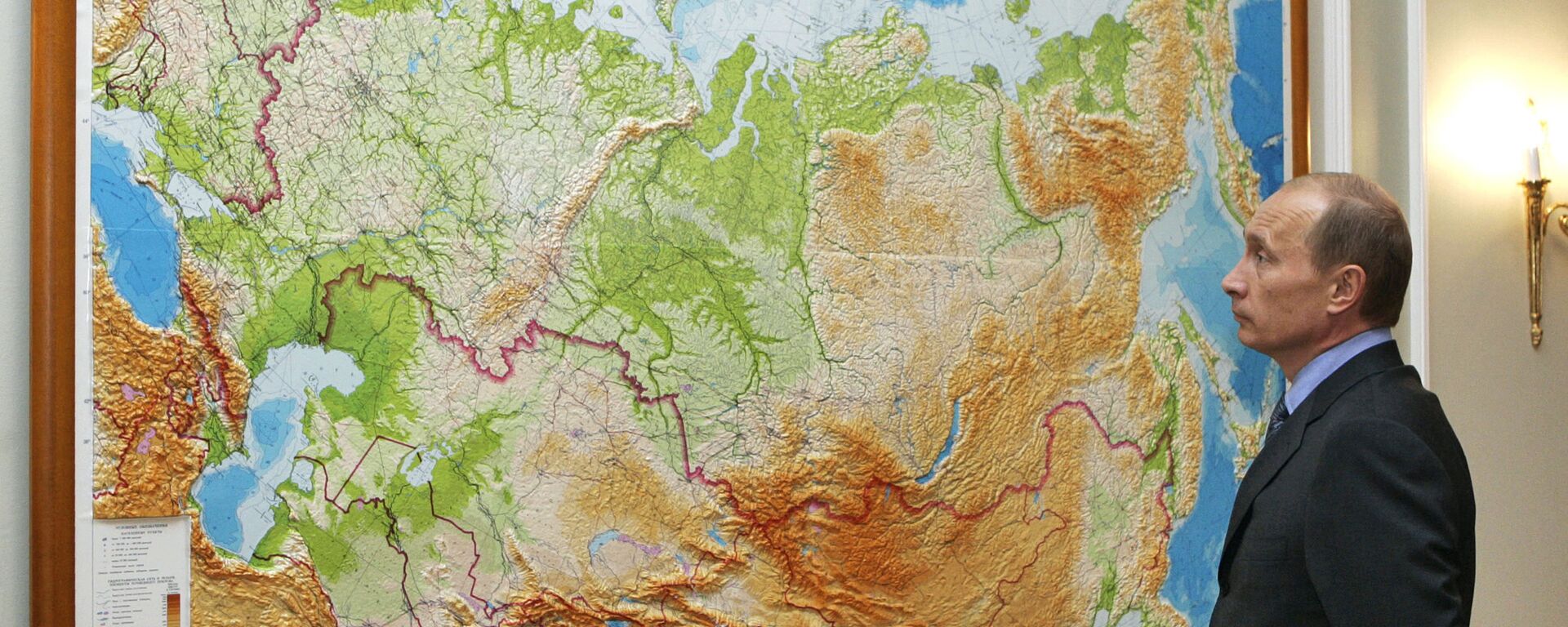
8 February 2024, 19:36 GMT
‘NATO Should Have Gone Away’
Ultimately, Maloof stressed, it would have been “nice” to see “total cooperation” between the West and Russia, not only for security reasons, but economic ones – particularly as far as Europe is concerned.
Better yet, he said, would have been for NATO to follow the Warsaw Pact's example and dissolve into oblivion at the end of the Cold War. “The Warsaw Pact went away. NATO should have gone away.”
Unfortunately, he said, the reality is that there are people in the Western security establishment who consider the alliance to be “their rice bowl as a growth industry,” a tool to advance the Western agenda not only in Europe, but Asia, the Arctic, and even outer space.
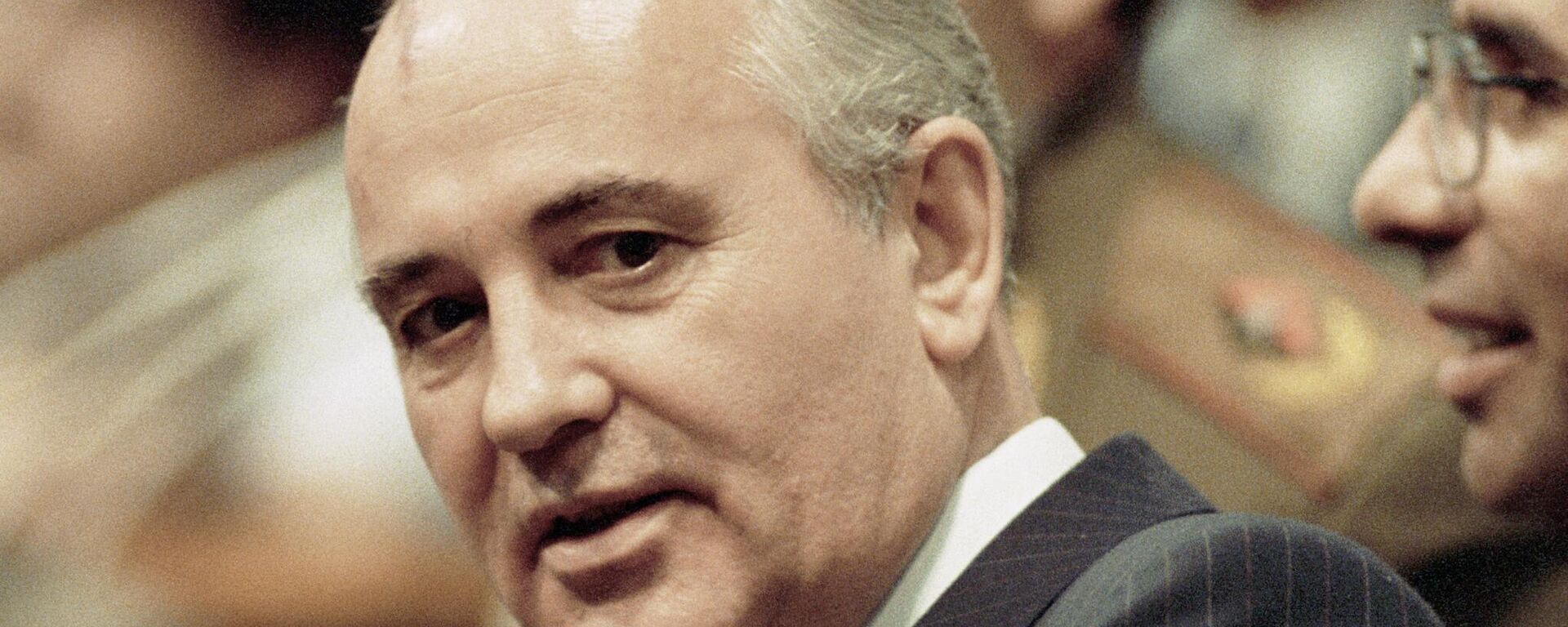
31 August 2022, 01:22 GMT
Whether in 1954, the early 1990s or the early 2000s, Moscow never got the chance to join the Western alliance. If the USSR and/or Russia had joined, it may have provided an opportunity to create “an effective system of collective security in Europe,” as Molotov envisioned in 1954.
On the other hand, given the alliance’s track record of aggression across the globe, from the Balkans and the Middle East to West Asia and North Africa, it seems for the best that Russia was never given the opportunity to become a member of the Western bloc.
